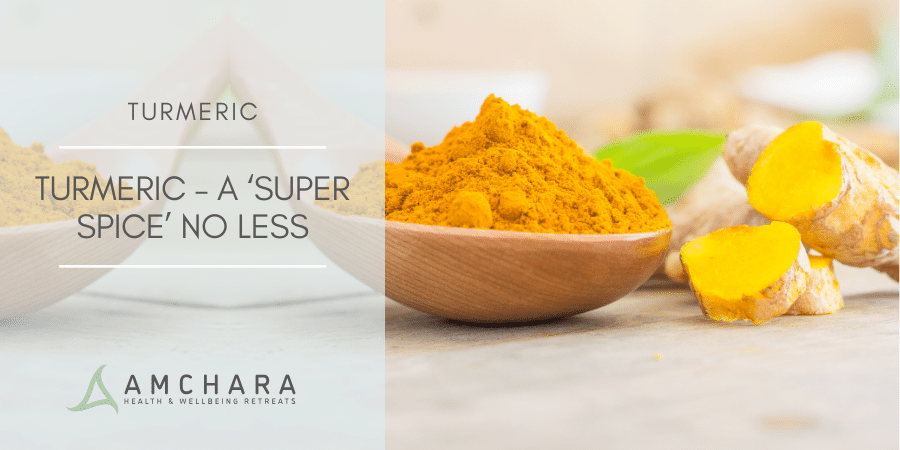Turmeric has become something of a superstar amongst the scientific community of late due to its amazing healing properties.
This wonderful golden spice originating from South Asia is obtained from the rhizome of a plant called Curcuma longa and has historically been used to add colour and flavour to meals and may also have had some religious significance.
As far back as 4000 years ago, it would have been commonly used by Ayurvedic and folk medicine practitioners to treat a number of ailments such as blood disorders, digestive problems, intestinal worms, fevers, skin disorders, rheumatism, arthritis and infectious diseases.
.
Nutritional Highlights
Turmeric is a readily available and inexpensive spice that contains the compound curcumin which according to extensive research is responsible for many of its amazing health benefits. Curcumin is one of 3 active (curcuminoids) including, Desmethoxycurcumin and bisdemethoxycurcumin.
Turmeric also contains volatile oils tumerone, atlantone and zingiberone, plus sugars, proteins and resins.
The curcuminoids found in turmeric are heralded for their numerous biological effects which includes anti-tumour, antibacterial, and antiviral activities – perfect for arming up your immune system and keeping you fit as a fiddle throughout the autumn and winter season.
As well as its powerful bioactive phytochemical ingredients, turmeric is also a very rich source of many essential vitamins and minerals including:
- Vitamin C – well known for shortening the duration of the common cold and generally perking up your immune system.
- Vitamin B6, niacin and riboflavin – These B vitamins work together to maintain energy levels and support your adrenals through stressful times. Very handy during the autumn and winter months when you’re feeling sluggish and under pressure on the approach to Christmas.
- Zinc – a mineral which plays an important role in immunity and wound healing
- Vitamin E – works alongside vitamin C as a powerful antioxidant.
- Iron – low iron status can leave you more susceptible to infectious diseases and can have a significant impact on the progression of an illness.
- Magnesium – not only helps to control hundreds of mechanisms in the body, but also interacts closely with the immune system helping to keep it strong.
.
Health Benefits
Turmeric has for centuries played a major role in both the Indian and Chinese medical systems. In more recent years, scientific attention has turned to curcumin – the pigment that gives turmeric its bright yellow colour. It has been the subject of a huge number of studies which have substantiated its benefits to human health. Mounting evidence demonstrates curcumin’s wide spectrum of therapeutic effects which include:
- Anti-inflammatory
- Anti-bacterial
- Anti-viral
- Anti-fungal
- Anti-spasmodic
- Hepatoprotective
- Anti-tumour
- Neuroprotective
These properties suggest that curcumin could potentially be used as a therapeutic agent in a range of inflammatory conditions such as diabetes, allergies, Alzheimer’s, arthritis and other chronic conditions.
.
Mechanism of Action
Curcumin is thought to work by altering and regulating immune function – stimulating the action of a host of immune cells that kill off microbes and prevent disease. It has also been shown to reduce the activity of pro-inflammatory molecules by lowering the levels of two enzymes that cause inflammation, as well as enhancing the production of cancer fighting compounds such as glutathione.
Furthermore it has been found to inhibit specific enzymes that are involved in the development of tumours. In addition to this it prevents platelets from clumping together to form blood clots.
.
Dosage & Safety
Research has shown that curcumin’s anti-inflammatory effects are comparable to several currently available over the counter pharmaceutical drugs. However curcumin shows none of the associated toxic effects associated with these drugs such as ulcer formation, intestinal bleeding and decreased white blood cell count.
Serious adverse effects have not been reported in humans taking high doses of curcumin, however turmeric may strengthen the effects of blood thinning drugs such as warfarin, aspirin and clopidogrel, raising the risk of bleeding. Turmeric may also lower blood sugar levels, so care should be taken when combining it with medication for diabetes.
According to several trials a daily dose of 100-200mg per kg of body weight offers good anti-inflammatory activity with negligible adverse effects. Curcumin on its own is not very well absorbed, however bioavailability can be improve significantly by consuming it with black pepper, which contains the active compound ‘piperine’ or a meal that includes healthy fats. The supplement bromelain also increases the absorption and anti-inflammatory effects of curcumin, so it is often combined with turmeric products.
Turmeric’s impressive healing properties together with its easy availability and low price make this a must-have ingredient for including in any hearty, warming, autumn and winter recipes.
Related topic:
REFERENCES
- Aggarwal BB & Jagetia GC. “Spicing up” of the immune system by curcumin. J Clin Immunol. 2007; 27(1) :19-35.
- Aggarwal BB, Goel A & Kunnumakkara AB. Curcumin as “Curecumin”: from kitchen to clinic. Biochem Pharmacol. 2008 15;75(4):787-809.
- Ali J, Ansari MJ,Kohli K & Raheman Z. Curcumin: A natural anti-inflammatory agent. Indian J Pharmacol. 2005; 37: 141-7.
- Ara SA, Lingappa A, Mudda JA & Rao P. Research on curcumin: A meta-analysis of potentially malignant disorders. J Can Res Ther. 2016; 12: 175-81.
- Bose S, Mukherjee S, Panda AK & Sa G. Curcumin and tumor immune-editing: resurrecting the immune system. Cell Division. 2015; 10:6.
- Cherayil BJ. The role of iron in the immune response to bacterial infection. Immunologic research. 2011;50(1):1-9.
- Murray M, Pizzorno J & Pizzorno L (2005). The Encyclopdia of Healing Foods. Bath Press: UK.
- Oregan State University. Curcumin. http://lpi.oregonstate.edu/mic/dietary-factors/phytochemicals/curcumin. [accessed 6.11.17]
- Prasad S, Aggarwal BB (2011). Turmeric, the Golden Spice: From Traditional Medicine to Modern Medicine. In: Benzie IFF, Wachtel-Galor S, editors. Herbal Medicine: Biomolecular and Clinical Aspects. 2nd edition. Boca Raton (FL): CRC Press/Taylor & Francis; 2011.
- University of Maryland Medical Centre. Turmeric overview. http://www.umm.edu/health/medical/altmed/herb/turmeric. [accessed 6.11.17]




